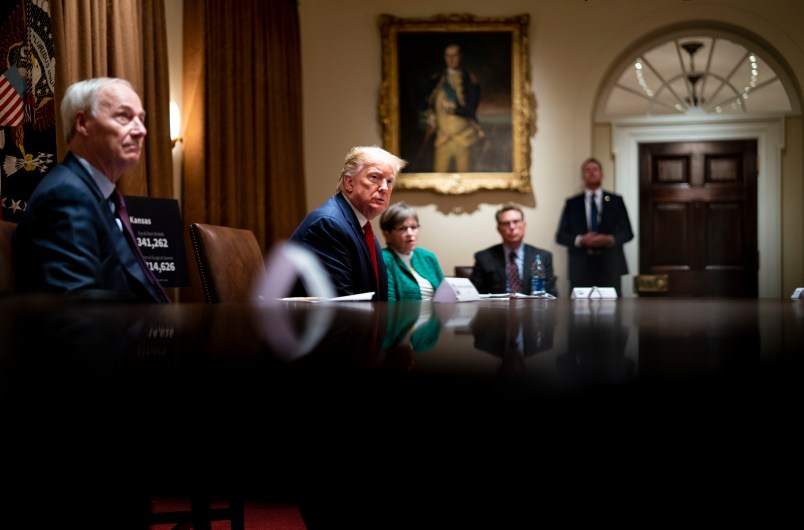In the aftermath of President Donald Trump’s flurry of executive actions — almost all of which overpromise and under-deliver — some Republican governors are admitting how difficult it will be for states to contribute their 25 percent of the weekly unemployment insurance benefit.
One of the most candid on that front has been Arkansas Gov. Asa Hutchinson (R).
“The state of Arkansas can make that happen, but it would be challenging and would take some time,” he told U.S. News and World Report. “We will have to adjust some of our priorities.”
During a Monday call with White House officials, Hutchinson reportedly urged them to go back to the negotiating table for a legislative deal. According to Politico, he dismissed the executive actions as “not our first choice.”
Hutchinson calculated that paying a quarter of the $400-a-week benefit Trump called for — 25 percent of which would come from states — would cost Arkansas $265 million for the 120,000 people qualified to receive the benefit.
Meanwhile, Arkansas, like many states grappling with the COVID-19 pandemic and resulting economic slowdown, is dealing with a significant budgetary shortfall. The state’s Department of Finance and Administration projected in March a loss of $353 million in revenue.
Hutchinson said that a factor he’d need clarification on before implementing the program is whether the funds used for the unemployment benefit would later be replenished. Under the Democrats’ expansive COVID-19 relief package, they would: the HEROES Act, passed by the House in May, allocates $1 trillion to state and local governments. Unlike the aid to states passed in the CARES Act, the bundle would allow states and municipalities to use the funds to make up for revenue shortfalls.
But White House negotiators Treasury Secretary Steve Mnuchin and White House Chief of Staff Mark Meadows rejected that plank of Democrats’ plan, offering only $150 billion for states in a counter-proposal.
The negotiation stalemate prompted Trump to sign a series of executive actions — one order and three memoranda — Saturday from his Bedminster, New Jersey golf club.
Though Trump touted the $400-a-week benefit as “generous,” Hutchinson isn’t the only governor to be less than enthused about the idea.
A letter sent out by the National Governors Association Monday — a bipartisan group of state executives chaired by Gov. Andrew Cuomo (D-NY) and vice-chaired by Hutchinson — implored the federal government to get back to dealmaking.
“We appreciate the White House’s proposals to provide additional solutions to address economic challenges; however, we are concerned about the significant administrative burdens and costs this latest action would place on the states,” they wrote. “The best way forward is for the Congress and the Administration to get back to the negotiating table and come up with a workable solution, which should provide meaningful additional relief for American families.”
“NGA has requested $500 billion in unrestricted state aid and NGA continues to urge Congress and the White House to reach a quick resolution to provide immediate assistance to unemployed Americans,” they continued. “This resolution should avoid new administrative and fiscal burdens on states.”
Individually, some Republican governors, in addition to Hutchinson, have expressed hesitancy about the President’s program.
Gov. Brian Kemp (R-GA), a vocal Trump ally, told the Times that his staff was still trying to figure out if they’d be able to implement it. “We’re digging in on that issue,” he said. Mark Butler, commissioner of the Georgia Department of Labor, added that they are “still awaiting clarification on the funding mechanism for this new benefit.”
Gov. Jim Justice (R-WV), while singing Trump’s praises, added that he was hoping the federal government would ultimately pay full freight.
“I believe that the federal government will eventually reverse their stance on that and that they will pay the full 100 percent in the end,” Justice said Monday. “But we’ve got the money set aside to make it work either way.”
Democratic governors were more blunt about the program’s shortcomings.
Gov. Gavin Newsom (D) said that the program would cost California $700 million a week.
“There is no money sitting in the piggy bank,” Newsom said. “It simply does not exist.”
Cuomo told reporters that the benefit would cost New York $4 billion by the end of the year.
“This only makes a bad situation worse,” Cuomo said. “When you are in a hole, stop digging. This executive order only digs the hole deeper.”
“It’s not workable in its current form,” Kentucky Gov. Andy Beshear (D-KY) added. “It’s something virtually no state can afford.”



